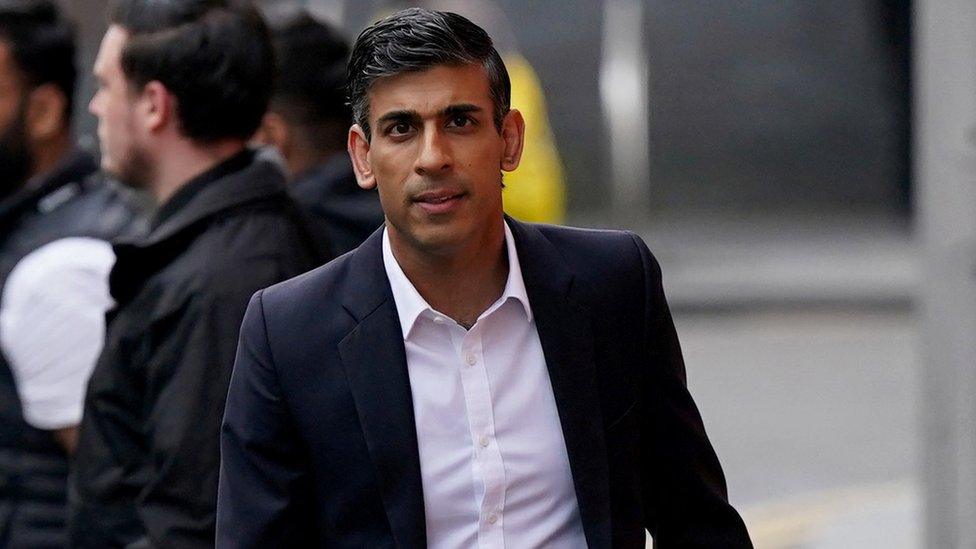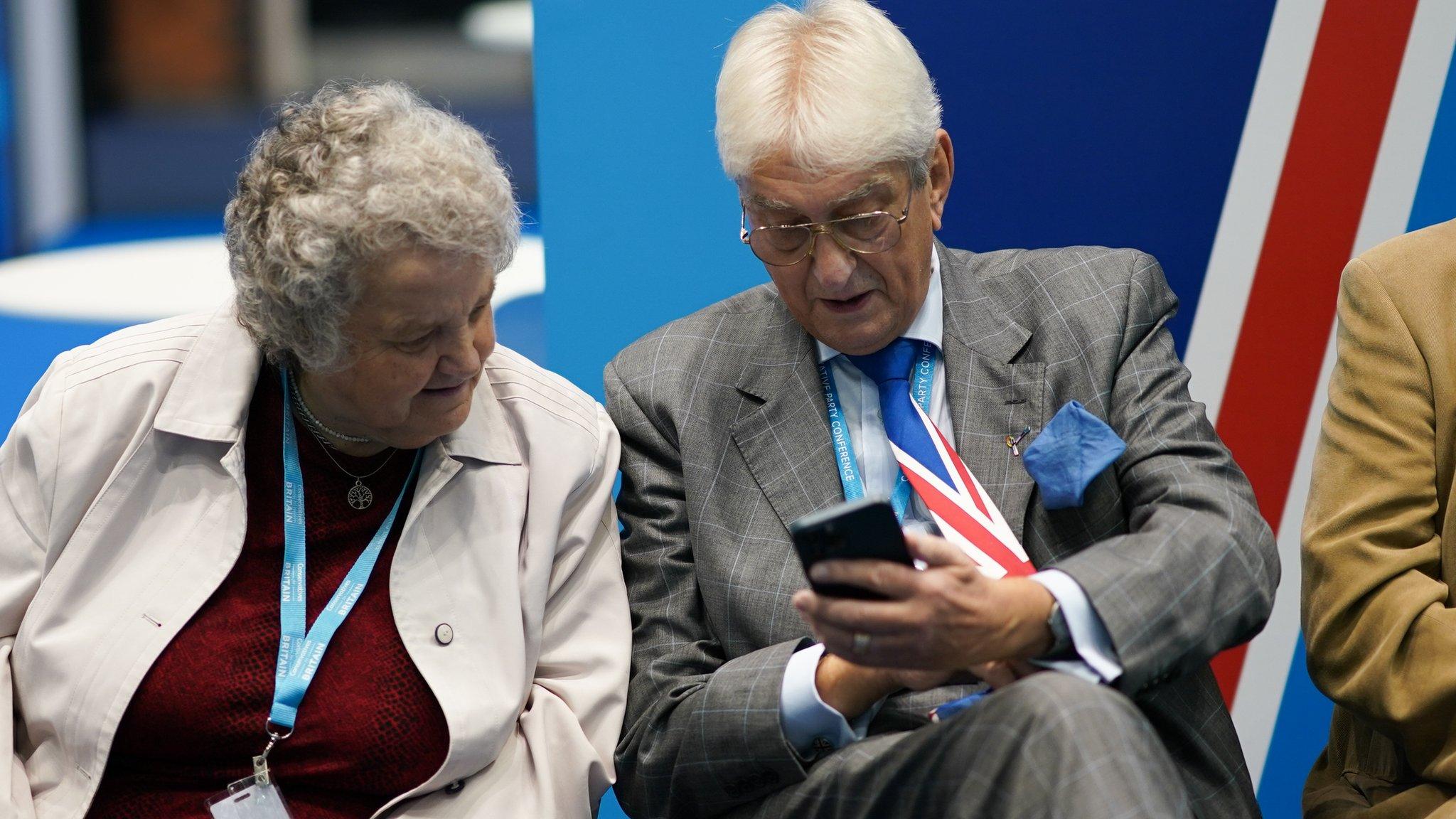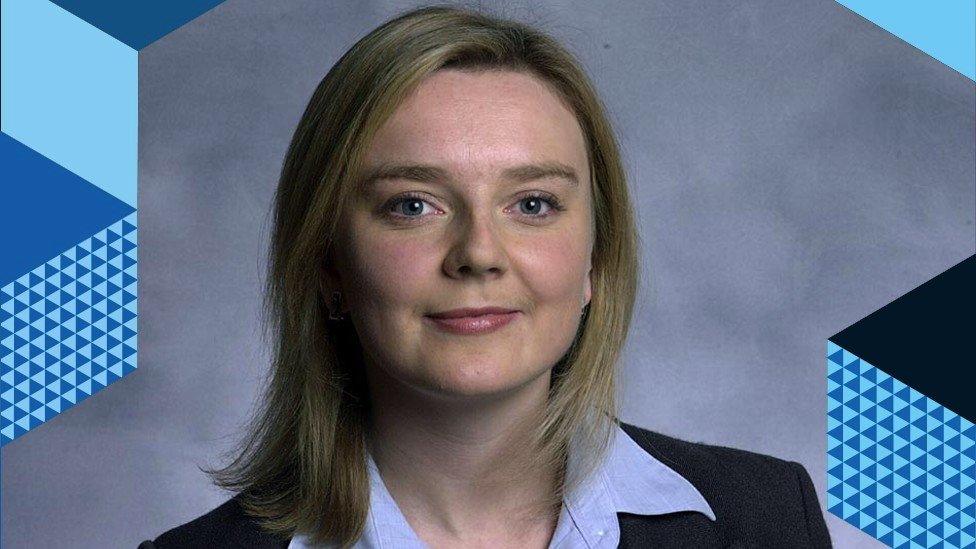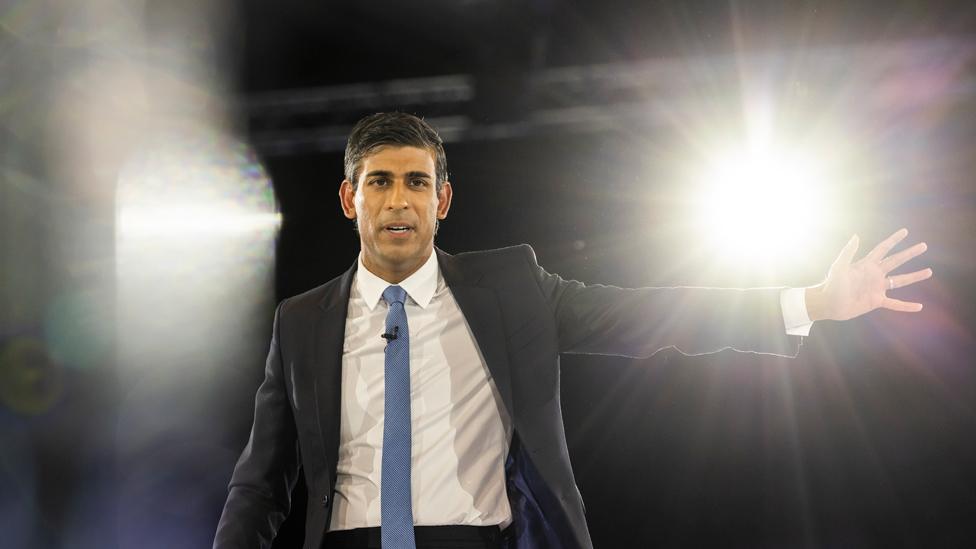Tory leadership: Rishi Sunak supporters deny U-turn in row over VAT cut
- Published
- comments

Supporters of Tory leadership contender Liz Truss have accused rival Rishi Sunak of performing a "screeching U-turn" by pledging to scrap VAT on energy bills if prices keep rising.
Mr Sunak, who has not promised any tax cuts during the contest so far, said the plan would help with living costs.
Earlier this year, he opposed Labour's plan to end the 5% VAT rate on household gas and electricity bills.
But Mr Sunak's team said he had been consistent in trying to help families.
The race to become the next Conservative leader and prime minister has turned into a bitter row over taxation.
Foreign Secretary Ms Truss and former chancellor Mr Sunak have set out very different visions of how to solve the cost-of-living crisis prompted by an inflation rate currently at more than 9%.
The VAT announcement marks a tactical shift from Mr Sunak, who is trailing in opinion polls of Conservative members, who start voting next week to decide the next PM.
Under his plan, the 5% rate on household energy would be scrapped for one year from October, if the price cap on bills rises above £3,000 for the typical household.
Mr Sunak said the "temporary and targeted" measure would save average households £160 a year, and ensure people get "the support they need", while also "bearing down on price pressures".
Watch: Tory leader debate disrupted after crash is heard
This contrasts with his approach as chancellor, when he voted against a Labour plan, external to scrap energy VAT in January, telling the Commons in February that such a policy would "disproportionately benefit wealthier households".
Mr Sunak, who has accused Ms Truss of making unfunded tax cuts that amount to £55bn, said his own plan would cost £4.3bn but, as it was temporary, it could be delivered within existing borrowing rules.
A Truss campaign source said: "It's good that Rishi has finally woken up and decided to offer something to people struggling with the rising cost of living.
"However, this feels like a screeching U-turn from someone who has spent the last few weeks of the leadership campaign branding everyone else's tax cuts immoral and fairytales."
But Transport Secretary Grant Shapps, who is campaigning for Mr Sunak, told BBC Breakfast the move was "consistent with what [the former chancellor] has done in the past".
"He has provided a lot of help in the past on energy bills and overall, in this cost-of-living squeeze, some £37bn of help."

Demolishing each other's platforms

What is increasingly defining the leadership contest isn't the respective policies of the candidates - it's their rebuttals.
Both contenders couldn't just say that each other's tax plans were wrong, or flawed, in last night's truncated Talk TV debate.
Instead, they were downright "immoral".
The candidates are not just setting out their stalls - they are demolishing each other's.
This was always going to be an intense part of the campaign, as we are just days away from Conservative members receiving their ballot papers.
The Conservatives have a good track record in uniting - at least publicly - after messy leadership contests.
But, in truth, it is hard to see how the two candidates could serve in each other's cabinet.
They have already given the opposition parties not just ammunition but whole silos of political weaponry.
And to maintain credibility, can either of them join a cabinet led by someone pursuing "immoral" policies?

In other policy announcements, Mr Sunak has also promised to double the time benefit claimants have to work before they can stop attending appointments with work coaches from nine to 18 hours per week.
Work and Pensions Secretary Therese Coffey, a Truss supporter, argued Mr Sunak had blocked a move to raise the limit to 12 hours earlier this year.

Why Sunak opposed VAT cut

The impact of cutting VAT on fuel bills from 5% to zero is different to the cost-of-living support Mr Sunak gave when he was chancellor.
He explained the difference himself in Parliament when setting out why he had rejected the VAT cut on 26 May.
"A flat-rate payment has the benefit of being more progressive than VAT, which obviously gives very high, or higher, tax discounts to those who are particularly wealthy or have large houses and energy bills," he told MPs.
In other words, the flat-rate £400 payment goes to every household, regardless of how much energy they use (although people with more than one home get payments for each one). The £650 payment only goes to people who qualify for certain benefits.
But cutting VAT will mean that people who use the most energy will save the most money, and Mr Sunak opposed that two months ago.

Meanwhile, Ms Truss said she would set police forces a target of cutting homicide, serious violence and neighbourhood crime by 20% before the end of the current Parliament.
Her campaign said she would publish league tables, with underperforming forces invited to a special meeting chaired by the home secretary.
A campaign source accused some chief constables of "not cracking down as hard as they should be".
Police forces would also be encouraged to send an officer to every burglary, under the Truss proposals.
But the Sunak campaign dismissed the proposals, calling them a "lightweight plan based on publishing data the government already does".

BBC REWIND: A unique archive of life in the UK since the 1940s, external
MATHS CHALLENGE: Can you predict the patterns?

- Published17 August 2022

- Published20 October 2022

- Published23 May 2024

